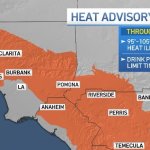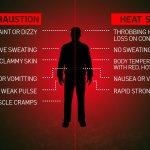Another Monday, another day of triple-digit temperatures in Southern California — and it’s only the start of the summer.
The extreme heat and dry conditions create a potentially explosive combination when it comes to wildfires, in addition to raising concern for the health of people and their pets.
Temperatures are expected to stay high all week, and a heat advisory is already in effect for much of the Inland Empire and in the valleys on Monday.

NBCLA
The heat really began over the weekend. Residents across SoCal have been trying to cool off during these first summer days, wasting no time in flocking to local pools and activity centers with hopes of finding some relief.
Monday is just about as hot as Sunday was, but temperatures should cool off very slightly throughout the rest of the week.
An area of high pressure is sitting over the West Coast, according to NBC4 meteorologist David Biggar. As that system moves toward the center of the country, California will start to cool off.
If you can, stay inside in the air condition if possible, and watch for heat related illnesses in the elderly, kids and pets until the area of high pressure moves out of the area. David Biggar has the forecast for June 27, 2022.
An area of low pressure will move in over northern California, Oregon and Washington State, encouraging the marine layer to get a little deeper.
Heat Safety Tips
Temperature can climb quickly, so stay aware of your environment and use these basic heat safety tips:
- Never leave people or pets alone in a closed car. Check your car before you lock it up and leave.
- Stay hydrated, drinking plenty of water even if you don’t feel that thirsty, and take breaks in the shade.
- Wear light, loose-fitting clothes instead of dark clothes that absorb more heat.
- Limit your time outside in the heat after 10 a.m., which is when temperatures climb even more. Stay in air conditioning whenever possible.
- Check in on the elderly, children, and pets, who are more vulnurable to heat related illnesses.

Heat exhaustion is one of those heat related illnesses. It can cause dizziness, thirst, heavy sweating, nausea and weakness, and can eventually lead to heat stroke if left untreated.
To treat heat exhaustion, move to a cooler area. Loosen your clothing and sip some cool water, and if your symptoms don’t improve, seek medical help.
Heat stroke is even more dangerous, and if left untreated, can cause death or permanent disability.
Someone experiencing heat stroke may not be sweating anymore, which makes it harder for their body to cool off.
If an overheated person becomes confused, experiences dizziness, or goes unconcious, call 911.
Move that person to a cooler area until help arrives. Loosen their clothing and remove any extra layers, and cool them with water or ice.
Wildfire Safety Tips
The LA County Fire Chief in 2020, Daryl Osby, had these tips for residents living near high-risk areas for wildfires:
- Clear leaves and other debris from roofs, gutters, and decks;
- Remove flammable materials like firewood stacks and low-hanging trees around your roof to create a defensible space around your home;
- Prepare your family’s “Ready, Set, Go!” wildfire action plan;
- Protect vents near eaves and consider installing double-pane windows;
- Make sure your address is visible to firefighters.
Chief Sam DiGiovanna of the Verdugo Fire Academy explains fire safety precautions residents should take during this wildfire season on Today in LA on Sunday, Oct. 26, 2019.
Water Safety Tips
It’s also important, as the summer continues and families spend more time in lakes, pools and other recreational areas with lots of water, to keep the following water safety tips in mind:
These are some swimming and pool safety tips from PoolSafely.gov, the American Red Cross and Safe Kids Worldwide.
- Never take your eyes off a child near or in a swimming pool;
- Don’t rely on fences or barriers and inflatable devices for safety in a swimming pool. Even if your child has had swimming lessons, they are still at risk of drowning; nothing substitutes adult supervision; and
- Learn CPR, because you never know when you might need this life-saving skill.

